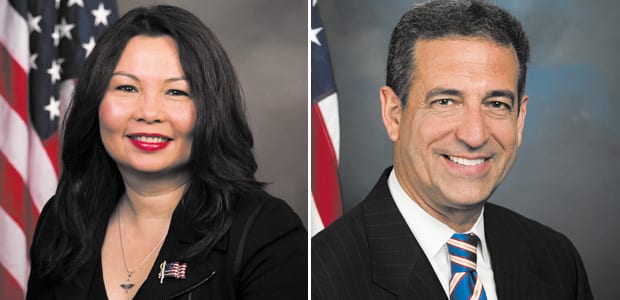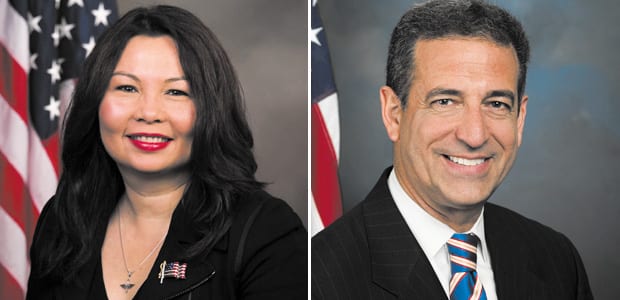Democrats have a chance to take control of the U.S. Senate, and here are some of the races that could make that happen

Tammy Duckworth, left and Russ Feingold
Lisa Keen | Keen News Service
lisakeen@mac.com
The better candidate on LGBT issues is fairly apparent in most U.S. Senate races this year. But in one race, the community seems split. And more important to LGBT people may be which party emerges with a majority of Senate seats once the dust clears on Nov. 8.
If Democrat Hillary Clinton wins the White House, Democrats will need to have retained their existing 46 votes and add four more Democrats. That would drop the Republican current seat count of 54 to 50, and with a 50-50 tie in the Senate, Democratic Vice President Tim Kaine would be the tie-breaker. Thus Democrats would hold the “majority.”
By having the majority, Democrats would take control of all Senate committees, thus making it more likely that pro-LGBT bills, such as the Equality Act, could be advanced, that openly LGBT nominees could be approved, and that pro-LGBT Supreme Court justices could be confirmed.
If Republican Donald Trump wins the White House, Democrats would need to have retained their existing 46 seats and pick up five new ones from the Republicans to secure the majority.
Nate Silver, the nationally-known, openly-gay election data guru, predicted last week that Democrats have a 57 percent chance of winning the majority in the U.S. Senate November 8.
A survey of the latest polls suggest the best bets for Democrats to pick up four to five seats are in: Illinois, where the Democratic challenger leads by 12 points in the polls; Wisconsin, where the Democratic challenger leads by 9.7 points; Indiana, where the Democratic candidate leads by 4 to 5 points; Pennsylvania, where the Democratic challenger leads by 0.6 points, and North Carolina, where the Democratic challenger is up by 0.2 points.
In other words, it’s a very tight race as to who will control the Senate next year.
Here’s a survey of how LGBT issues are playing into these important races:
Illinois: The LGBT community is surprisingly split between the two candidates for U.S. Senate from Illinois. The Lesbian Political Action Committee (LPAC) has endorsed and contributed to Democratic challenger U.S. Rep. Tammy Duckworth, while the Human Rights Campaign has endorsed and contributed to incumbent Republican Sen. Mark Kirk.
HRC based its endorsement largely on the fact that Kirk is the first — and so far only — Republican to co-sponsor the Equality Act. He also supported marriage equality and co-sponsored a bill to help stop anti-LGBT bullying.
LPAC endorsed Duckworth, praising her “long record of legislative activity in support of LGBTQ Americans,” but added that its support was also aimed at establishing a “progressive majority” in the Senate.
HRC’s Congressional scorecard has given Kirk only a 78 percent record of voting in favor of LGBT positions, while it’s given Duckworth a perfect 100. Interestingly, the pro-gay American Unity PAC has broadcast ads against Duckworth.
Wisconsin: Former U.S. Sen. Russ Feingold a Democrat, is challenging Republican incumbent Sen. Ron Johnson for his old seat. Feingold was a strong supporter of LGBT equal rights while in the Senate; he earned scores of 96, 90, 89, and 88 from HRC.
Johnson’s HRC scores have been the lowest — zero and 15. He has voted against the Employment Non-Discrimination Act (ENDA), against inclusion of sexual orientation and gender identity in the Violence Against Women Act, and against LGBT appointees. But he did say he wouldn’t oppose marriage equality if Wisconsin voters “decide that they want gay marriage.”
Both HRC and LPAC have endorsed and given contributions to Feingold.
Indiana: This is an open seat being vacated by Republican Dan Coats, whose HRC voting scores have been consistently among the lowest.
Democrat Evan Bayh earned HRC scores of 89, 75, 100, 90 and 84 during his previous sessions in the U.S. Senate. He voted for adding sexual orientation and gender identity to hate crimes laws, voted to repeal Don’t Ask-Don’t Tell, against a proposed constitutional ban on marriage for same-sex couples, and for ENDA.
Rep. Todd Young, the Republican candidate for the seat, earned a zero and a 30 for his voting record in the House so far, voting with HRC only to provide funding for housing for people with AIDS.
Democrats have drawn attention in Indiana to Young’s vote against repealing DADT.
Pennsylvania: Democrat Katie McGinty puts her support for LGBT equality upfront on her campaign website, promising support for anti-discrimination protections in employment, housing and healthcare, and to fight for the right of transgender Americans to serve in the military and to receive the health care services they need. She has actively sought LGBT support for her election, staging a tour of LGBT nightclubs in Philadelphia. She’s earned the endorsement of Equality Pennsylvania and LPAC, and HRC has kicked in $2,000 to her campaign.
Incumbent Republican Sen. Patrick Toomey has earned low grades from HRC for his voting record on LGBT issues during the past three sessions: 16, 40 and zero. Among other things, he opposed equal Social Security and veteran benefits for same-sex couples and he voted against inclusion of sexual orientation and gender identity in VAWA.
North Carolina: This is where LGBT issues have the greatest possibility of influencing voters. A recent poll found that voters identified HB2 as the third “most important issue facing North Carolina right now,” and 52 percent said the law should be repealed.
North Carolina’s incumbent Republican Sen. Richard Burr has been trying to walk a fine line, saying the law should be repealed but saying the problem was that Charlotte provoked the legislature into passing HB2 when it passed a non-discrimination law. Burr’s voting record has warranted the lowest possible scores — zero and 15 — on LGBT issues, according to HRC. He’s voted against ENDA, against repeal of DADT, and against President Obama’s LGBT nominees to various positions.
His Democratic challenger, former ACLU/NC Director Deborah Ross, has been pushing for repeal of HB2. She has the endorsement of LPAC, plus a $5,000 contribution.
Other Senate races of interest to the LGBT community next month include:
California: Long-time LGBT supporter Barbara Boxer is retiring from her seat and two Democrats are going after it: California Attorney General Kamala Harris and U.S. Rep. Loretta Sanchez.
Both are also long-time supporters of LGBT equality. Sanchez’s voting record in Congress earned her the top score — 100 — from HRC the past two sessions, and scores of 85, 88 and 75 prior to that. As attorney general, Harris was prominent in the fight against Proposition 8 and for the state law banning conversion therapy.
Equality California and LPAC have endorsed Harris. Neither LPAC nor HRC has contributed to the campaigns.
Nevada: The Democratic nominee, Nevada Attorney General Catherine Cortez Masto, has not been a consistent friend to the LGBT community. As attorney general, she filed a brief to defend the state’s ban on marriage for same-sex couples. A month later, she withdrew the brief, citing a 9th Circuit decision that made the ban “no longer defensible.” The pro-gay American Unity PAC has broadcast an ad against Masto over her support for a deal with Iran, noting that “it’s illegal to be gay” in Iran. But LPAC has endorsed her bid.
Masto’s opponent for the seat being vacated by Senate Minority Leader Harry Reid is Rep. Joe Heck. Heck opposed marriage for same-sex couples but voted against an amendment that sought to eliminate sexual orientation and gender identity from the VAWA. And in committee, he voted against a measure attempting to undermine President Obama’s executive order against sexual orientation and gender identity discrimination by federal contractors. On the HRC’s scorecard for Congressional voting record on LGBT issues, Heck earned the worst possible score — zero — during his first session and a 30 during his second session.
HRC has contributed to Masto.
Kentucky: Lexington’s openly gay mayor, Jim Gray, has taken on Republican incumbent U.S. Sen. Rand Paul.
Gray, a Democrat, told the Washington Post that his being gay has not been an issue in the campaign, but he’s also trailing 12 points behind Paul, according to the most recent poll. And the Kentucky Herald-Leader notes that a significant number of “Business Leaders for Jim Gray” have failed to contribute to his campaign coffers. His campaign has raised $2.8 million, compared to Paul’s $3.1 million.
Utah: A transgender candidate, Misty Snow, won the Democratic primary in Utah to take on incumbent Republican U.S. Sen. Mike Lee. That makes her the nation’s first transgender candidate for the U.S. Senate from a major party. A UtahPolicy.com poll found Lee with a 37-point lead over Snow in mid-September. Snow has raised only $11,000 for her campaign, compared to Lee’s $3.2 million. Snow has used her campaign to criticize Lee for co-sponsoring the anti-LGBT First Amendment Defense Act.
© 2016 Keen News Service. All rights reserved.
This article appeared in the Dallas Voice print edition October 14, 2016.

